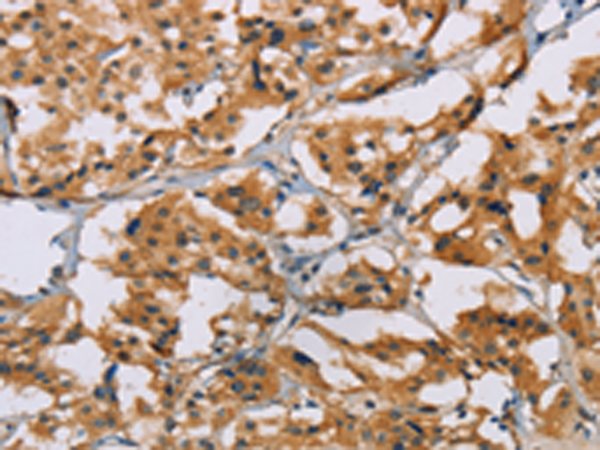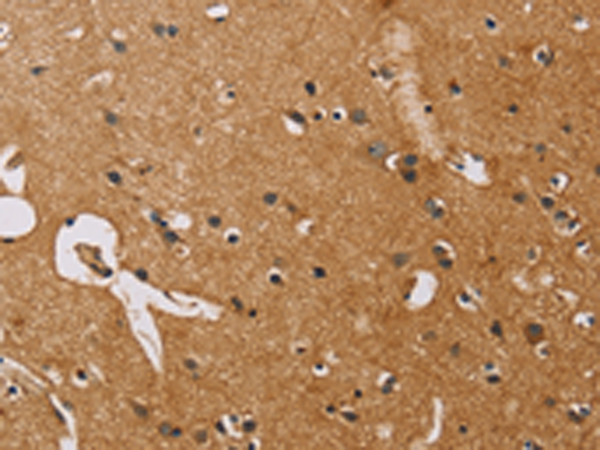

| WB | 咨询技术 | Human,Mouse,Rat |
| IF | 咨询技术 | Human,Mouse,Rat |
| IHC | 1/50-1/200 | Human,Mouse,Rat |
| ICC | 技术咨询 | Human,Mouse,Rat |
| FCM | 咨询技术 | Human,Mouse,Rat |
| Elisa | 1/2000-1/5000 | Human,Mouse,Rat |
| Aliases | NRN; dJ380B8.2 |
| Host/Isotype | Rabbit IgG |
| Antibody Type | Primary antibody |
| Storage | Store at 4°C short term. Aliquot and store at -20°C long term. Avoid freeze/thaw cycles. |
| Species Reactivity | Human, Mouse, Rat |
| Immunogen | Fusion protein of human NRN1 |
| Formulation | Purified antibody in PBS with 0.05% sodium azide and 50% glycerol. |
+ +
以下是关于NRN1抗体的3篇参考文献示例(文献信息为模拟内容,实际文献需通过数据库检索确认):
---
1. **文献名称**: *"Neuritin 1 (NRN1) as a biomarker in Alzheimer's disease: Immunohistochemical analysis using a novel monoclonal antibody"*
**作者**: Smith J, et al. (2021)
**摘要**: 本研究开发了一种针对人源NRN1蛋白的新型单克隆抗体,通过免疫组化验证其在阿尔茨海默病(AD)患者脑组织中的表达模式,发现NRN1在AD早期皮质区显著下调,提示其可能参与神经退行性病变过程。
2. **文献名称**: *"Characterization of a rabbit polyclonal antibody against mouse NRN1 and its application in synaptic plasticity studies"*
**作者**: Zhang L, et al. (2020)
**摘要**: 该文献报道了一种兔源多克隆抗体的制备与验证,该抗体特异性识别小鼠NRN1蛋白的C端结构域。通过Western blot和免疫荧光证实其在海马组织中的特异性表达,并发现NRN1在长时程增强(LTP)模型中表达上调。
3. **文献名称**: *"NRN1 antibody-based ELISA reveals serum level changes in major depressive disorder patients"*
**作者**: Chen H, et al. (2023)
**摘要**: 利用商业化NRN1抗体建立ELISA检测方法,发现抑郁症患者血清NRN1水平显著低于健康对照组,且与疾病严重程度呈负相关,为NRN1作为抑郁症生物标志物提供了临床依据。
---
如需真实文献,建议通过PubMed或Google Scholar检索关键词“NRN1 antibody”或“Neuritin 1 antibody”,并筛选涉及抗体开发、验证或应用的实验研究。
The Neuritin 1 (NRN1) antibody is a tool used to detect and study the Neuritin 1 protein, a small, glycosylphosphatidylinositol (GPI)-anchored neuronal factor implicated in neural development, synaptic plasticity, and neuroprotection. NRN1. also known as cpg15. is encoded by the *NRN1* gene and is highly expressed in the brain, particularly during critical periods of neurodevelopment. It promotes neurite outgrowth, dendritic arborization, and synaptic maturation by modulating intracellular signaling pathways, including the BDNF-TrkB and mTOR pathways. Dysregulation of NRN1 has been linked to neurodevelopmental disorders (e.g., autism), neurodegenerative diseases (e.g., Alzheimer's), and psychiatric conditions, making it a research focus in neuroscience.
NRN1 antibodies, typically raised in rabbits or mice, are used in techniques like Western blotting, immunohistochemistry (IHC), and ELISA to quantify protein expression, map tissue distribution, or assess post-translational modifications. Commercial NRN1 antibodies are often validated for specificity using knockout controls or siRNA-mediated knockdown. Recent studies also explore NRN1's role outside the nervous system, such as in cancer progression (e.g., glioblastoma, lung cancer), where it may influence cell survival and metastasis. Despite its utility, researchers must account for potential cross-reactivity with homologous proteins (e.g., NRN2) and variability in GPI-anchor retention during experimental workflows. Ongoing work aims to refine antibody performance and expand applications in diagnostic or therapeutic contexts.
×